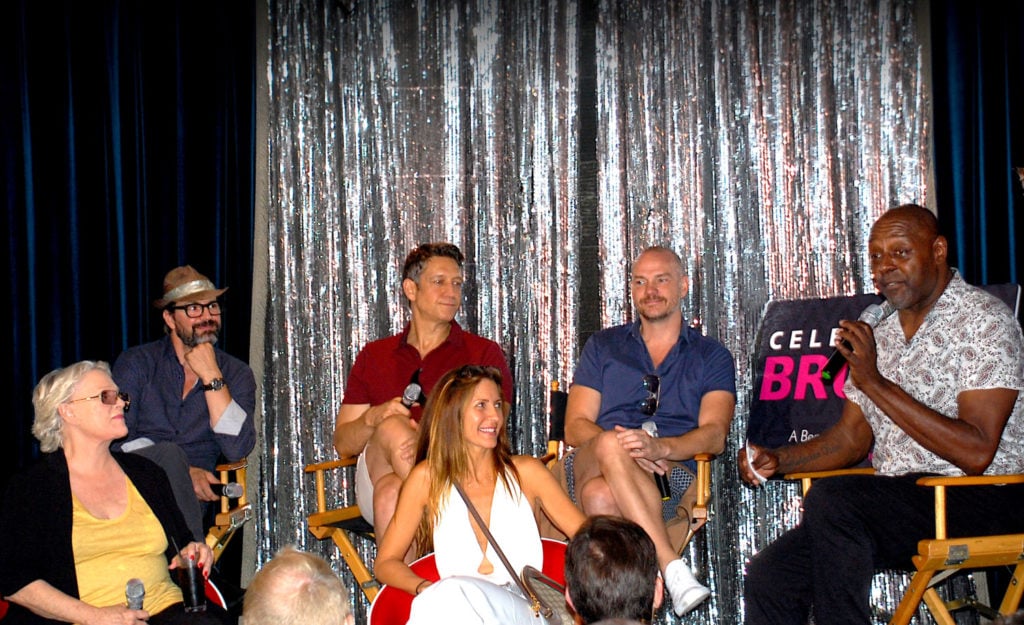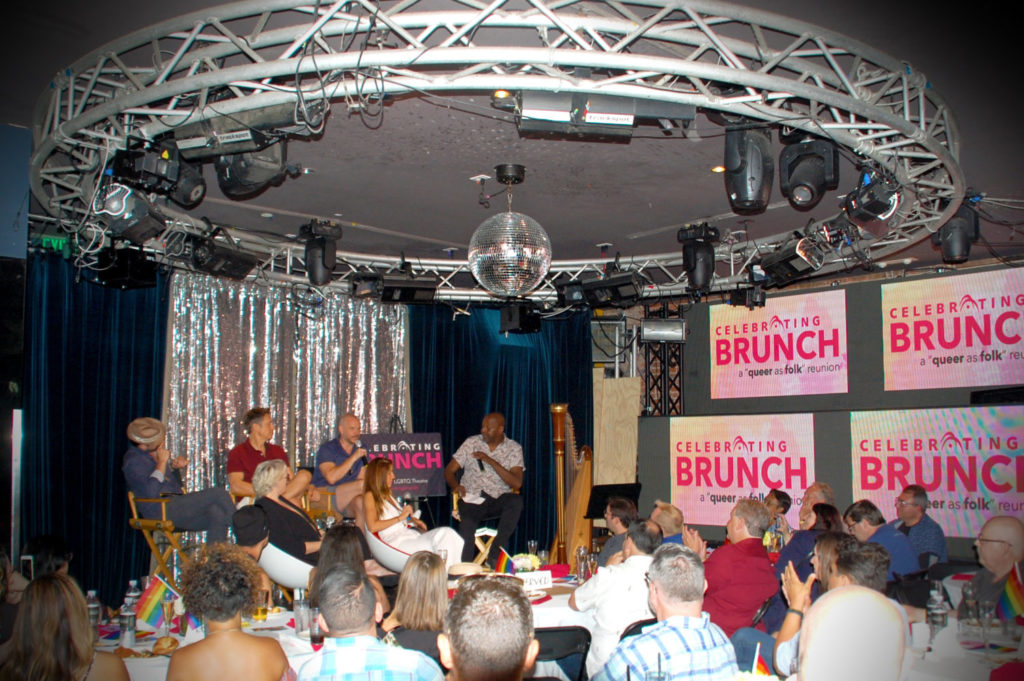“I don’t believe in love; I believe in fucking. It’s honest, it’s efficient. You get in and out with the maximum of pleasure and minimum of bullshit. Love is something straight people tell themselves they’re in so they can get laid, and then they end up hurting each other because it was all based on lies to begin with.”
—Brian Kinney, Queer As Folk “Premiere”
It’s pretty hard to imagine that dialogue like this was said on television in the year 2000, just one month after George W. Bush was elected President of the United States. The medicinal cocktails that helped curtail the AIDS epidemic did become more prevalent a few years prior and the LGBTQ community was finally starting to wake up from that nightmare, but the HIV ordeal set us back, and the progress we made since Stonewall seemed abruptly cut short in the Reagan era because of it.
Thankfully, President Clinton helped usher in a little more acceptance in the ‘90s. RuPaul was on the airwaves, The Birdcage was a hit film and by 1998, Will and Grace premiered on NBC’s “Must See TV” Primetime Thursday, quickly becoming one of the most successful television shows with gay principal characters ever.
Then, on December 3, 2000, Showtime premiered the first episode of Queer As Folk, a show that would change many lives in the LGBTQ community. Based on Russell T. Davies’ British drama that premiered on their Channel 4 in 1999, the American version on Showtime promised to keep the risque and provocative storylines including the graphic sexual encounters. After all, it was on premium cable! The show followed the lives of two lesbians and five gay men living in Pittsburgh, which included main characters Michael Novotny (Hal Sparks) and Brian Kinney (Gale Harold), as well as Michael’s mom Debbie Novotny (Sharon Gless) and his Uncle Vic (Jack Wetherall).
The first episode alone tackled the issue of gay adoption, with Brian and one half of the lesbian couple, Lindsay (Thea Gill), having a baby after he artificially inseminated her. Also in that episode, Brian meets the much younger, still in high school Justin (Randy Harrison). The pair’s sex scene was about as groundbreaking as it comes, pun intended. It featured the first simulated sex scene between two men shown on American television and included mutual masturbation, anal sex and rimming.
Bush and Dick Cheney may have been running on a platform of banning same-sex marriage in the U.S. Constitution, but on cable television, gay men were finally seeing their love and sex lives represented in a more accurate way for the first time. And sex wasn’t the only LGBTQ taboo that Queer As Folk took on over the course of its five-season run. The show also featured storylines involving coming out, recreational drug and alcohol use and abuse in the LGBTQ community, HIV/AIDS and “bug chasers” (those who actively try to become HIV-positive), gay-bashing, sex work, workplace discrimination based on sexual orientation and gay marriage, to name a few but not all.

(Brisco Diggs)
Last month, Celebration Theatre, the country’s oldest, continually producing LGBTQ theater (founded in L.A. in 1982 by Mattachine Society pioneer Chuck Rowland), celebrated the show as part of its “Celebrating Brunch” fundraising series. Fans could purchase a general or VIP ticket for brunch at Micky’s in West Hollywood to witness a reunion of five of the main cast members (the actors who played Brian, Emmett, Ben, Debbie and Melanie) in conversation with Celebration Theatre’s Artistic Director Michael A. Shepperd after posing for meet and greet photos.
When asked where they thought their characters would be today, 19 years since the show ended, the answers were interesting. Gless, who played Debbie as the PFLAG mom every gay man wished he had growing up, said that she’d be working in the diner and would probably be married to Detective Horvath. On the show, Debbie said she wouldn’t wed until her son could also do so legally in the US.
Peter Paige (Emmett) referred to Emmet’s “75 jobs in 83 episodes, so fuck if I know” but added that he likes to think that Emmett got together with his quarterback love interest. Robert Gant, who played Ben said he’d be trying to help Pete Buttigieg get elected, and Harold — whose role as the infamous Brian made for the gay man every fan fantasized he could either be or be with — said that he would have woken up a bit to “make some sense out of the nightmare that was his personal life.”
Gant also said that he thought Ben would unfortunately still be struggling for equality in various parts of the world, and spoke of the relevance in the show today, which led to discussion and the cast sharing their thoughts on a proposed reboot. It was originally intended for air on Bravo but is reportedly now going to air on NBCUniversal’s new upcoming streaming service. The cast revealed that none of them are involved and that they’re not thrilled about the reboot, which is a total reset: a different cast in a different city, and most likely present day.
The LGBTQ community has made a lot of progress in the last two decades since the show’s premiere, and like every culturally popular show from the past, there are some aspects to Queer As Folk that are a bit outdated or underrepresented. All of the main characters were white and cisgender, so perhaps the reboot can have some more people of color and trans characters represented on screen.
Some of Queer‘s actors, including Harold and Sparks, were not even LGBTQ, and straight actors taking roles from gay ones (in gay roles) is an issue that is heavily debated right now. Also, the recreational drug use and casual sex depicted graphically on the show might be true to life for a lot of people in the LGBTQ community, but not for everyone. And finally, technological advances such as dating apps like Grindr and Tinder, and the rise in streaming services like Netflix has also impacted the LGBTQ community drastically in the last 20 years. The show may have tackled cruising in storylines, but “cruising” in 2019 is mostly done online now and hence completely different than it was when the show was on television.

(Brisco Diggs)
Queer As Folk might have been the first popular drama, or first television show period, to feature an entire cast of LGBTQ characters. It opened the doors for similar shows that came after it like Showtime’s The L Word, which premiered in 2004 (and is getting its own reboot soon), Logo’s Noah’s Arc in 2005, Ryan Murphy’s The New Normal in 2012, HBO’s Looking in 2014 and, most recently, FX’s Pose, also from Murphy, which just finished its second season. Unfortunately, even though more content is being created than ever thanks to streaming platforms, there haven’t been enough scripted television shows that focus only on LGBTQ people like Queer did. It’s great that there’s more LGBTQ inclusion in general and that we have principle, well-developed LGBTQ characters such as Titus on The Unbreakable Kimmy Schmidt or Cam and Mitch on Modern Family, but nothing save for Pose, has dealt with LGBTQ issues with the kind of depth Queer As Folk did.
It really was a global phenomenon, as evidenced by the diverse geographic turnout at the Celebration Theatre event. Fans traveled from all over the country — Austin, Las Vegas, San Diego, Washington, D.C., Chicago, New York and San Francisco — to attend. A few even came all the way from Argentina. One fan shared that seeing his struggle with HIV depicted so realistically on TV changed his life. Everyone in the cast agreed that being on the show was one of the greatest gifts of their lives, and for the LGBTQ community nearly two decades later, the feeling is obviously still mutual.
Celebration Theater, 6760 Lexington Ave., Hollywood; 323-957-1884, celebrationtheatre.com,
The original Queer As Folk can be streamed with subscription at sho.com/queer-as-folk.
More info on the new NBCUniversal Streaming Service (home of the QAF re-boot) at nbcuniversal.com.
Advertising disclosure: We may receive compensation for some of the links in our stories. Thank you for supporting LA Weekly and our advertisers.

